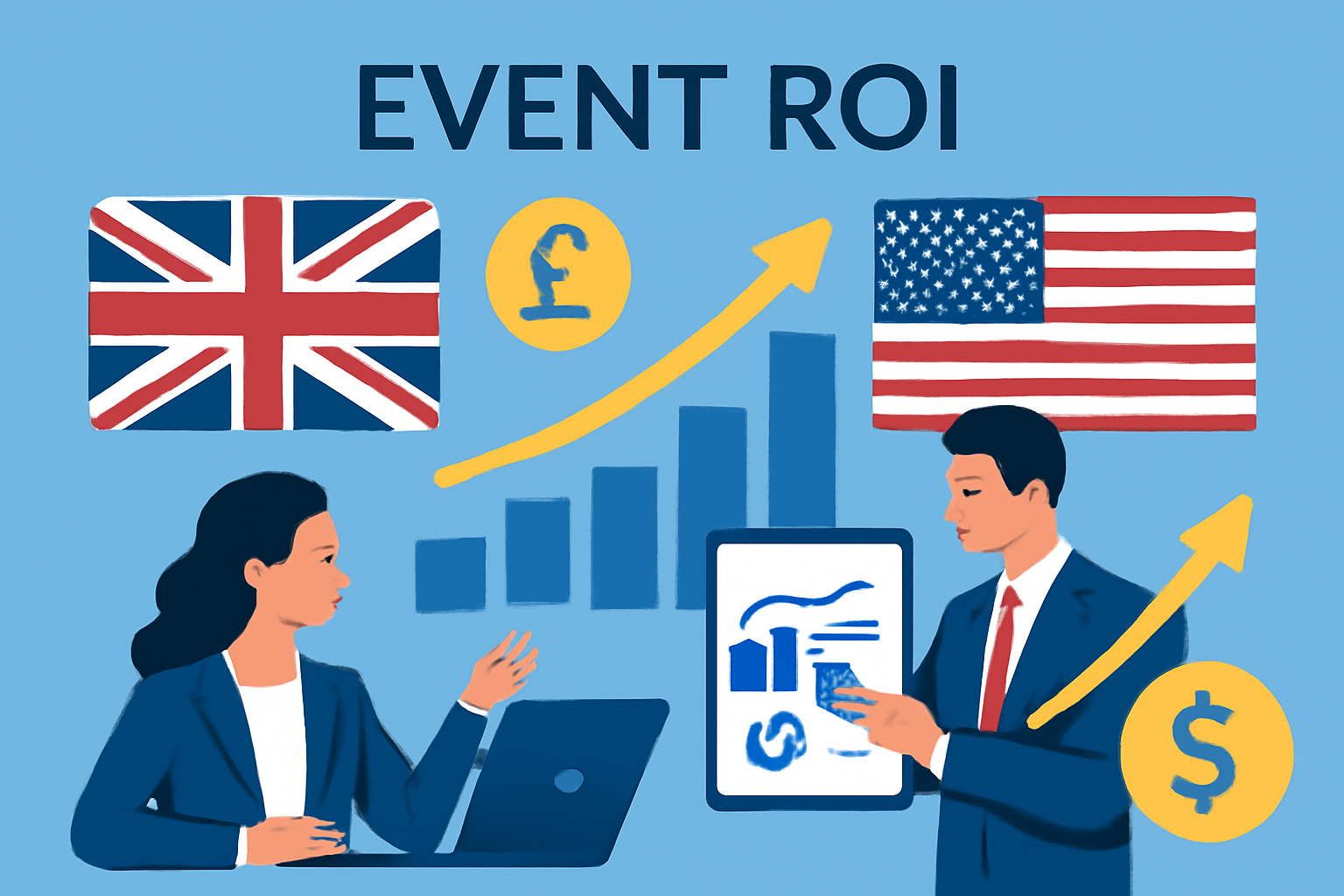Event Return on Investment (ROI) in the UK and USA: Measuring Success in 2025
In the present cut-throat business environment, businesses in the UK and USA are putting in loads of money into events—such as corporate conferences, trade shows, product launches, or virtual experiences. However, investing in events would only make sense if companies were able to gauge and increase their Event Return on Investment (ROI).
Event ROI used to be simply a matter of counting ticket sales or the number of attendees. However, it now emphasizes the total value that can be drawn from an event—for instance, brand awareness, lead generation, customer retention, and sustainable revenue growth.
What is Event ROI?
Event ROI is a metric that reflects the worth a company gets from its money spent on hosting or being part of an event. Generally, ROI is measured using one basic formula:
ROI = (Net Profit / Cost of Investment) × 100
In the case of events, “profit” might consist of the following returns besides monetary ones:
- Income from ticket sales, sponsorship, and partnerships
- Targeted leads and sales that have been converted
- Recognition of the brand and exposure in the media
- Loyalty to the brand and re-engagement with the company
Event ROI in the UK
- United Kingdom’s events sector is one of the main engines of the country’s economy, injecting billions of pounds yearly. Besides top international conferences taking place in London, Manchester, and Birmingham, businesses are now going to more extended horizons to calculate returns on their investments instead of just focusing on direct ticket sales.
Key ROI Metrics in the UK:
- Lead Quality over Quantity – UK companies are more interested in solid B2B relationships and LTS than just the number of visitors.
- Brand Positioning – Some UK events concentrate on improving corporate reputation within industries like finance, fintech, and technology.
- Sustainability Impact – Due to the implementation of stricter environmental regulations, UK companies are now using eco-friendly practices and the loyalty gained among green consumers to measure the return on investment.
- Hybrid Event Reach – The broadcast of online events held physically enables enterprises to keep track of the return on investment through web-based attendance and worldwide accessibility.
Event ROI in the USA
The United States is known to have one of the largest event industries globally, in particular, the cities of Las Vegas, New York, and Chicago. In such a place, the measurement of ROI is usually more aggressive and sales-oriented.
Key ROI Metrics in the USA
- Revenue Impact – US organizations monitor the direct sales, the additional sales, and the customer acquisition costs which have a connection with the participation in the event.
- Data-Driven Engagement – The use of advanced event tech and analytics platforms (for instance, Cvent and Eventbrite) is a common practice to measure the behavior of attendees, their engagement, and the conversion process.
- Sponsorship Value – Sponsors in America require comprehensive ROI reports that illustrate the exposure, the number of times the advertisement has been viewed, and the business leads that have occurred as a result of it.
- Experience-Driven Marketing – The ROI is gauged by the extent to which the event can foster the loyalty of the brand and the repeated purchases.
Comparing UK and USA Approaches
Though both places reckon the worth of event ROI their focal points differ:
- UK: Main features of the corporate image, eco-friendliness, and the trust of the future.
- USA: Emphasis on sales and marketing, use of data, and giving back to sponsors.
These areas are turning to event technology, AI analytics, and hybrid event formats to make their ROI measurement more accurate and to ensure that every dollar or pound spent results in visible business value.
Strategies to Maximize Event ROI in 2025
The companies no matter in the UK or the USA are able to increase the return on investment (ROI) by:
- Defining Clear Goals: Setting the event goal such as raising sales, creating awareness, or deepening relationships.
- Implementing Advanced Monitoring Tools: Employ CRM systems along with event analytics platforms to track attendee engagement to sales pipeline.
- Widening Hybrid and Virtual: Provide online participation as an option for extending the event’s reach.
- Post-Event Marketing: Personalized emails, surveys, and offers can be used for lead nurturing.
- Green and Diversity Issues: Foster brand loyalty by becoming a brand loved by customers.
